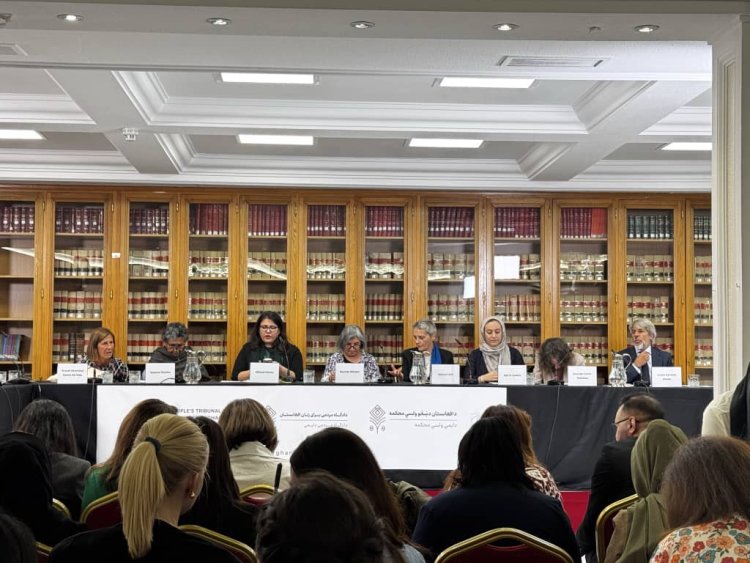Afghan Women’s Voices Heard at the People’s Tribunal in Madrid

The People’s Tribunal for Afghan Women concluded its three-day hearings on Friday, October 10, in Madrid, Spain, after listening to testimonies and reviewing evidence on violations of women’s and girls’ rights in Afghanistan. The tribunal brought together international judges, prosecutors, and Afghan witnesses, with the goal of documenting the Taliban’s crimes and creating moral and legal pressure for global accountability.
The tribunal was organized by a coalition of human rights organizations, including Rawadari, the Human Rights Defenders Assembly, the Afghanistan Human Rights and Democracy Institute, and the Research and Development Organization. The sessions were held in the main hall of Complutense University of Madrid and included hearing victims’ testimonies and reviewing indictments and reports by international experts.
Four Afghan prosecutors — Benafsha Yaqoobi, Azadah RazMohammad, Mohib Madaser, and Orzala Nemat — led the prosecution. The judges were Araceli García del Soto, Elisenda Calot-Martínez, and Emilio Ramírez Matos from Spain; Ghazal Haris from Afghanistan; Mai El-Sadany from Egypt and the United States; Marina Forti from Italy; Rashida Manjoo from South Africa; and Kalpana Sharma from India.
The prosecutors filed a case against the Taliban, naming the group’s senior leadership, including Hibatullah Akhundzada, Abdul Ghani Baradar, Sirajuddin Haqqani, Mohammad Yaqoob Mujahid, and other top officials. They argued that the Taliban’s treatment of women is systematic and intentional, constituting gender-based crimes against humanity.
The tribunal stated that on September 16, 2025, an official indictment and an invitation to respond were sent via email to the Taliban’s Department of Human Rights in the Ministry of Foreign Affairs. However, no reply was received.
During the first two days, the tribunal examined issues such as the exclusion of women and girls from education and employment, the ban on political and civic participation, restrictions on access to healthcare, the Taliban’s treatment of women and girls with disabilities, arbitrary arrests and torture, the requirement of a male guardian (mahram) for travel, and other forms of social repression.
More than twenty witnesses from across Afghanistan testified in person, via video link, or through written statements. They shared detailed accounts of systematic discrimination, gender-based persecution, deprivation of education and work, and violent treatment by the Taliban. The organizing committee stressed that the Taliban’s actions amount to gender apartheid, warning that these ongoing human rights violations have global implications and require urgent international attention.
On the final day of the tribunal, Friday, October 10, the panel of judges issued a preliminary statement declaring that “the voices of Afghan women have been heard.” They pledged to carefully review all evidence and testimonies to assess the Taliban’s actions as crimes against humanity, particularly gender-based persecution, and to remind the world of Afghanistan’s international human rights obligations.
The judges also emphasized the need to recognize gender apartheid as a crime against humanity. They said they would work to challenge impunity and the absence of accountability, paving the way for justice for Afghan women and girls. The judges called for global action to ensure accountability, reparations, and the restoration of women’s and girls’ human rights in Afghanistan.
The tribunal announced that within the next two months, it will issue its final judgment on the Taliban’s violations of women’s rights, including the denial of education and employment and other forms of gender-based violence.
The People’s Tribunal for Afghan Women followed the model of historical people’s tribunals, such as the Bertrand Russell Tribunal of the 1960s. Although it carries no formal legal authority, its purpose is to document testimonies and submit a final report to international bodies, including the United Nations Human Rights Council, to create moral and legal pressure on the Taliban. Ultimately, the tribunal seeks to provide a platform for victims and survivors, record the Taliban’s crimes against women and girls, and challenge the normalization of injustice and impunity.
